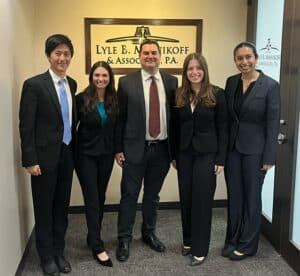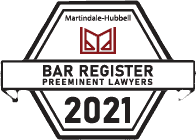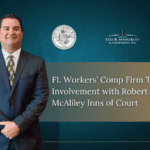Depending on how you answered your post-hire questionnaire…
In today’s world, a lot of companies will require new employees to fill out a post-hire medical questionnaire. Typically, this questionnaire will ask general questions about your medical history, prior injuries, whether or not you have ever had a workers’ compensation claim in the past, etc… Your answers could have a major impact on your potential entitlement to benefits.
In 1961 the Florida Supreme Court handed down their ruling in Martin v. Capenter, 132 So. 2d 400 (Fla. 1961). This ruling attacked the issue of the post-hire medical questionnaire. The Supreme Court essentially ruled that you are not eligible for workers’ compensation benefits for an otherwise compensable injury if the employee intentionally makes misrepresentations regarding prior medical history. In order for the defense to apply, the Employer/Carrier must prove four criteria: 1) that there is a causal relationship between the injury and the false representation; 2) the employee knee the representation was false; 3) the employer relied on the false representation; and 4) such reliance resulted in consequent damage to the employer.
Simply proving that the injured worker lied about a medical condition is not enough to support the defense.
The Employer/Carrier must prove a causal relationship between the pre- existing condition, and the new injury. This must be done through expert medical testimony.
This prong sounds difficult for the Employer/Carrier to prove. It is not. In workers’ compensation cases, the Employer/Carrier gets to pick the doctors. This means that if you are treating pursuant to a claim, you are going where they tell you. Typically, these doctors are very conservative and often make opinions that seem to favor the insurance carrier. The one who is paying the bill. Once they present evidence to the doctor that there is a pre-existing condition, chances are that the opinion will now longer be that the work accident is the major contributing cause, or 51% or more the need for treatment.
The second prong is that the employee must have known that the statement was false. A misrepresentation is different from a misstatement. A misrepresentation means that there was intent to mislead whereas a misstatement means that the employee may have simply forgot.
This also seems easy on paper. We forget things all the time. Depending on how in depth the employee’s medical history is, it certainly is not unfathomable that someone might forget an old knee injury or back injury etc… The problem is that it is extremely hard to show that someone simply forgot an injury or surgery or treatment to the same body part that is being claimed as part of the workers’ compensation claim. Unfortunately, people do try to obtain benefits under false pretenses and it is difficult, at times, to flush out what employees simply forgot and what employees are intentionally making false statements.
The third and fourth prongs essentially mean that the employer detrimentally relied on the false statements. It does not mean, as some believe, that the employer would not have hired the employee but for the false statements. It means that the Employer/Carrier need only show evidence supporting an inference that the employer would not have hired the employee had it known about the prior condition. This inference is sufficient even without Employer/Carrier’s witness expressly stating that the employee would not have been hired.
What should one do? Err on the side of caution.
Obviously, the best course of action is to be honest regarding any prior accidents and/or injuries. If you are going to answer “no” be completely sure that you have never injured the body part that they are asking about because you don’t want it to turn into a he said/she said scenario. I would even put on the side of the question something to the effect of “not that I can recall” or “I am not sure.” You can even leave the space blank if you wish. Interestingly, if you leave the space blank, that cannot be held against you. Blank spaces are not misrepresentations. They are not even misstatements.
Without a representation, there can be no reliance. It is the employer’s duty to follow up on an omission.
Over the past seventeen years Mr. Masnikoff has been practicing, he has seen employers and insurance carrier’s try to use the Martin v. Carpenter defense countless times. These situations can become extremely complex and it is important to have a dedicated, experienced advocate on your side. We would love to discuss your case and explain all of your options and benefits that you are entitled to under the law. If you or someone you know is in this situation, please give us a call at (877) 817-43127.
























